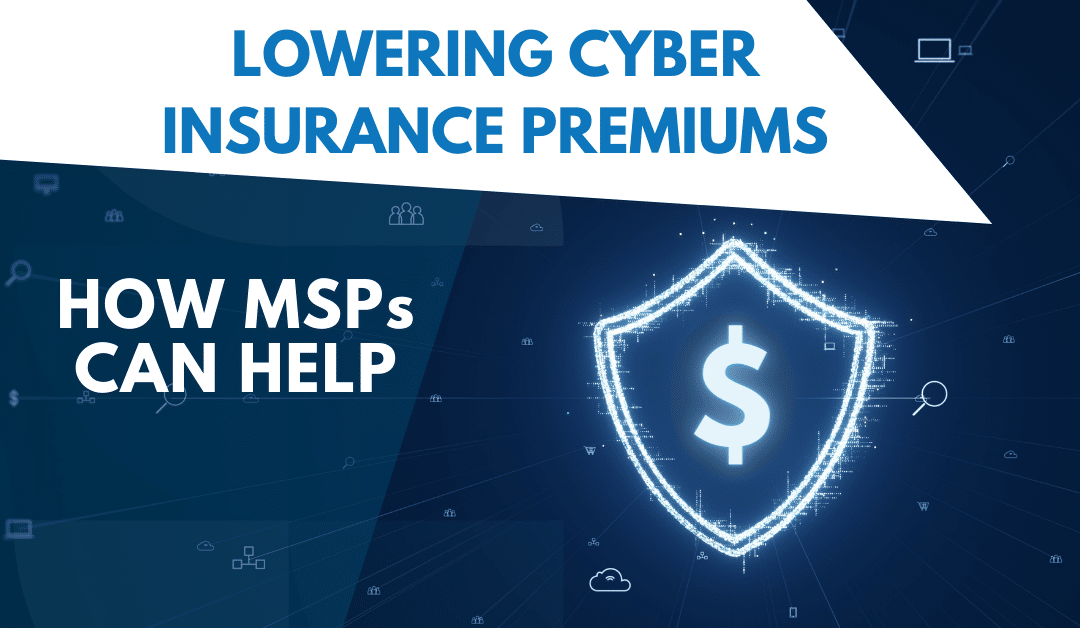With the rapid digitization of businesses during Covid, it gave cybercriminals a much larger pond to fish in. In the one year from 2019 to 2020, social cyber attacks (ie. Phishing, Pharming etc) went up 197%, and identity theft went up 169%. With these drastic shifts, it was sure to be followed by increases in cybersecurity insurance premiums for companies. So what can you do to combat these higher costs?
According to a report by Ponemon Institute, the average cost of a data breach for small businesses is $3.86 million. However, businesses that have a Managed Service Provider (MSP) in place can reduce their risk of a data breach by up to 53%. Businesses that work with MSPs are less likely to experience a data breach and, therefore, may be able to lower their cyber insurance premiums.

Shielding Your Small Business: Cyber Insurance Requirements
In today’s digital age, small businesses are increasingly vulnerable to cyber threats such as data breaches, ransomware attacks, and phishing scams. Cyber insurance is one way for small businesses to protect themselves against the financial impact of a cyber-attack. However, it’s important to understand the cyber insurance requirements for small businesses.
Typically, cyber insurance policies have specific requirements that businesses must meet to be eligible for coverage. Small businesses should carefully review their policy coverage to ensure that it meets their specific needs and that they understand the limits and exclusions of the policy.
By properly understanding and meeting the cyber insurance requirements for small businesses, organizations can better protect themselves against cyber threats and minimize the potential financial impact of a breach. However, you do not have to do this by yourself, a Managed Service Provider can help your business become compliant and alleviate some cybersecurity insurance premiums.

Strategies to Lower Your Cyber Insurance Premiums
A cyberattack can be catastrophic for small businesses, leading to financial losses, reputational damage, and even business closure. As a result, cyber insurance has become an essential part of risk management for small businesses.
According to a study by Accenture, 68% of small businesses do not have a cybersecurity strategy in place. This puts them at a higher risk of a cyberattack and can lead to higher cyber insurance premiums.
By working with an MSP, small businesses can develop a comprehensive cybersecurity strategy that includes risk assessments, employee training, and incident response planning. This can help reduce the overall risk of a cyberattack and lead to lower cyber insurance premiums.
Managed Service Providers (MSPs) can play a critical role in helping organizations alleviate rising cyber insurance premiums through monitoring, compliance, and strategy development.
By providing proactive monitoring and management of an organization’s IT infrastructure, MSPs can help identify potential security vulnerabilities and take corrective action before they are exploited. This can help reduce the risk of cyber-attacks and data breaches, which in turn can lead to lower insurance premiums.

Enhancing your Compliance
MSPs can also help ensure that organizations are compliant with relevant security standards and regulations, such as the upcoming June FTC Safeguard rule, HIPAA, or PCI DSS. Compliance is a key factor that insurance providers consider when determining premiums, and non-compliance can result in higher premiums or even denial of coverage.
By working with MSPs to develop and implement comprehensive security policies and procedures, organizations can demonstrate their commitment to security and reduce their risk profile, which can help reduce insurance premiums.
Finally, MSPs can help organizations develop a cyber security strategy that aligns with their business goals and risk tolerance. This can involve identifying key assets, developing incident response plans, and implementing security technologies and controls that are appropriate for the organization’s size and industry.
By taking a proactive approach to security, organizations can demonstrate to insurance providers that they are taking steps to mitigate their risk and reduce the likelihood of a successful cyber-attack. This can help reduce insurance premiums and improve the organization’s overall security posture.
Learn more about how to simplify your company’s cybersecurity.

The Importance of a Strong Security Posture
Managed Service Providers (MSPs) can play a critical role in helping small businesses establish a strong security posture. MSPs can provide small businesses with access to the latest security technologies and expertise, as well as a range of services to help identify and mitigate potential security threats.
For example, MSPs can conduct regular vulnerability assessments and penetration testing to identify weaknesses in a business’s IT infrastructure, and then recommend and implement appropriate security controls and technologies.
MSPs can also provide employee training on cyber security best practices, such as how to identify and respond to phishing attacks, and how to use strong passwords and multi-factor authentication. By implementing a comprehensive security program and working with MSPs to establish a strong security posture, small businesses can better protect themselves against cyber threats and demonstrate to customers and partners that they take security seriously. This also plays a big role in lowering premiums.
In conclusion, managed service providers can help small businesses lower their cyber insurance premiums by reducing their overall risk of a cyberattack. MSPs can provide businesses with continuous monitoring and threat detection, help them meet compliance requirements, and develop a comprehensive cybersecurity strategy.
By working with an MSP, small businesses can improve their security posture and reduce the likelihood of a successful cyberattack. This can lead to lower cyber insurance premiums and provide peace of mind for small business owners.
Follow Us!




Recent Comments